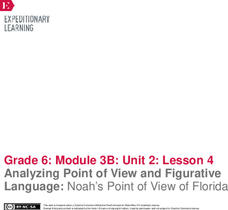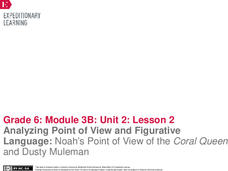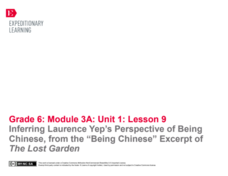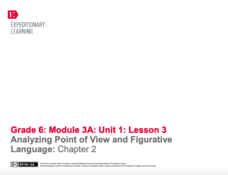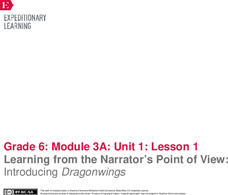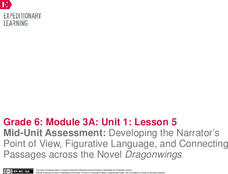EngageNY
Carl Hiaasen’s Perspective of Florida: Part 3
What is your perspective? Scholars read Florida: A Paradise of Scandals Excerpt 2 and look for unfamiliar words. They determine author perspective by completing Gathering Evidence of Hiaasen’s
Perspective: Part three graphic organizer...
EngageNY
Carl Hiaasen’s Perspective of Florida: Part 2
Look it up. Scholars read Florida: A Paradise of Scandals Excerpt 1 and use a dictionary to look up any unfamiliar words. They then do a close read of the text and answer text-dependent questions. Learners analyze author perspective by...
EngageNY
Carl Hiaasen’s Perspective of Florida: Part 1
Share some tips. Scholars read Five Creative Tips from Carl Hiaasen to determine the gist. They think-pair-share their ideas about the text with a partner and then focus on challenging words and answer text-dependent questions.
EngageNY
Mid-Unit Assessment: Analyzing Point of View and Plot Development in Flush
It's the halfway point—there's no turning back now. Scholars work on the mid unit assessment for Flush. For the assessment, learners analyze the point of view and plot development by annotating the text using sticky notes and underlining...
EngageNY
Analyzing Point of View and Figurative Language: Noah’s Point of View of Florida
Fishing for words. Scholars search for unfamiliar words in pages 27-29 of Flush, place them in their word catchers, and complete part of Noah’s Point of View graphic organizer. After identifying figurative language, learners analyze tone...
EngageNY
Analyzing Point of View and Figurative Language: Noah’s Point of View of the Coral Queen and Dusty Muleman
Literally, what's the meaning? Scholars read pages seven through nine of Flush and discuss literal and nonliteral meaning with figurative language. Learners work in triads to identify and define unfamiliar words. They then complete a...
EngageNY
End of Unit Assessment: Finding Evidence of Laurence Yep’s Perspective on Being Chinese in Dragonwings and Determining Connotative Language
There's a fine line between reality and fiction. As an end-of-unit assessment, scholars complete worksheets to analyze how Laurence Yep's perspective on being Chinese factors into his novel Dragonwings. Next, pupils engage in a class...
EngageNY
Inferring Laurence Yep’s Perspective of Being Chinese, from the “Being Chinese” Excerpt of The Lost Garden
It's all about perspective! Using the resource, scholars read a third excerpt from Laurence Yep's autobiography, The Lost Garden. As they read, individuals complete graphic organizers using clues from the text to infer the author's...
EngageNY
Finding Evidence of Laurence Yep’s Perspective of the Police in Dragonwings
Perspective is everything. Using a graphic organizer, pupils determine Laurence Yep's perspective of the police in his novel Dragonwings. Additionally, scholars complete anchor charts to identify connotative language in the text.
EngageNY
Introducing The Lost Garden and Finding Evidence of Laurence Yep’s Perspective on What It’s like to Fit into Another Culture on Pages 66– 67 of Dragonwings
How does culture shape perspective? Pupils consider the question as they read an excerpt from Laurence Yep's autobiography, The Lost Garden. Using a graphic organizer, they gather textual evidence and make inferences about the author's...
EngageNY
Analyzing Point of View and Figurative Language: Chapter 3
Get to the point ... the point of view, that is! Pupils analyze Laurence Yep's Dragonwings for tone, figurative language, and point of view by completing graphic organizers. Scholars also read an excerpt from the novel and record the...
EngageNY
Analyzing Point of View and Figurative Language: Chapter 2
Just get to the gist. Scholars work in pairs to find the gist of an excerpt from Laurence Yep's Dragonwings. Pupils also complete graphic organizers to analyze the text for tone, point of view, and figurative language.
EngageNY
Learning from the Narrator’s Point of View: Introducing Dragonwings
Journey into the past with Laurence Yep's Dragonwings. Scholars complete anchor charts to analyze techniques the author uses to develop the narrator's point of view in his novel. As they read, pupils also complete word catchers to track...
EngageNY
Inferring Laurence Yep’s Perspective on the Police, from the Crime in the Neighborhood Excerpt of The Lost Garden
Gist get to the point! Pupils read another excerpt from The Lost Garden, author Laurence Yep's autobiography. Working with partners, scholars annotate the text to look for the gist and record unfamiliar vocabulary in their word catchers.
EngageNY
Mid-Unit Assessment: Developing the Narrator’s Point of View, Figurative Language, and Connecting Passages across the Novel Dragonwings
Let's get creative! As part of a mid-unit assessment, scholars create a piece of artwork illustrating the theme from Laurence Yep's novel, Dragonwings. Additionally, pupils use a graphic organizer to identify figurative language in the...
EngageNY
Analyzing Point of View and Figurative Language: Chapter 1
Check out the view! Scholars complete a graphic organizer to analyze how Laurence Yep develops a character's point of view in Dragonwings. Additionally, pupils re-read parts of the novel and annotate the text on sticky notes, looking for...
Teaching Tolerance
Where We Stand
Everyone is entitled to their own opinion. Academics learn strategies to share their opinions and agree or disagree with others in a respectful manner. The resource provides scenarios to help individuals form opinions and share them with...
EngageNY
Vocabulary Strategies and Questions from the Text: Close Reading Part 2 of The Lightning Thief (Chapter 3, Continued)
That is very unexpected! Scholars take a close look at the word unexpectedly from chapter three of The Lightning Thief. They examine the prefix and think of other words that have the same prefix. Learners regroup in their triads and take...
EngageNY
Inferring about Character: Close Reading of The Lightning Thief (Chapter 3)
Stick it to them! Scholars work to write the gist of sections of text on sticky notes and place them in chapter three of The Lightning Thief. They then share what they wrote with classmates in their triad. The group reads selections of...
EngageNY
Inferring about Character: Getting to Know Percy (Chapters 1 and 2)
What a character! Scholars look at two chapters in The Lightning Thief to make inferences about the character Percy. They record both the character's challenges and responses. Learners then work in their triads to discuss the gist of...
EngageNY
Meeting the Main Character: Launching The Lightning Thief (Chapter 1)
Three is company! Scholars work in groups of three to discuss quotes from the first pages of The Lightning Thief. Each group records their thinking on the paper of the quotes before talking about Percy's character using the Making...
PBS
The Symbolism of Sunflower Seeds in Ghost
Ghost by Jason Reynolds is a coming-of-age book that resonates with teenagers who have experienced childhood trauma. Explore the novel with an interactive resource that focuses on the author's use of symbolism, particularly with...
Literacy Design Collaborative
Identifying Points of View through Character Responses in R.J. Palacio's "Wonder"
Readers examine the book Wonder by R.J. Palacio to determine how characters respond differently to situations and events. Readers annotate and analyze the text and carry out group discussion using accountable talk. They work in small...
Penguin Books
Addressing Text Complexity - Making Independent Reading Meaningful
Many English teachers dream of a classroom full of readers silently enjoying their books. A useful guide helps make that dream become a reality by providing book recommendations for a range of readers. Each suggestion includes the...






